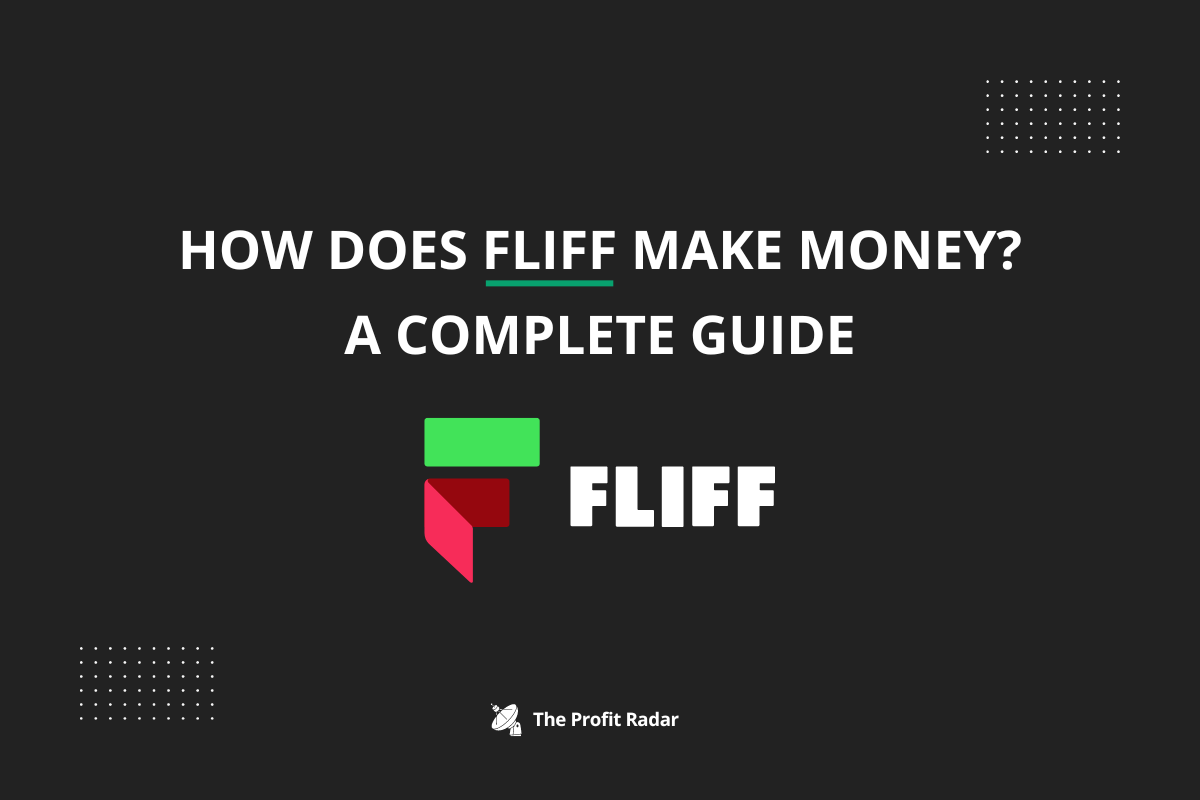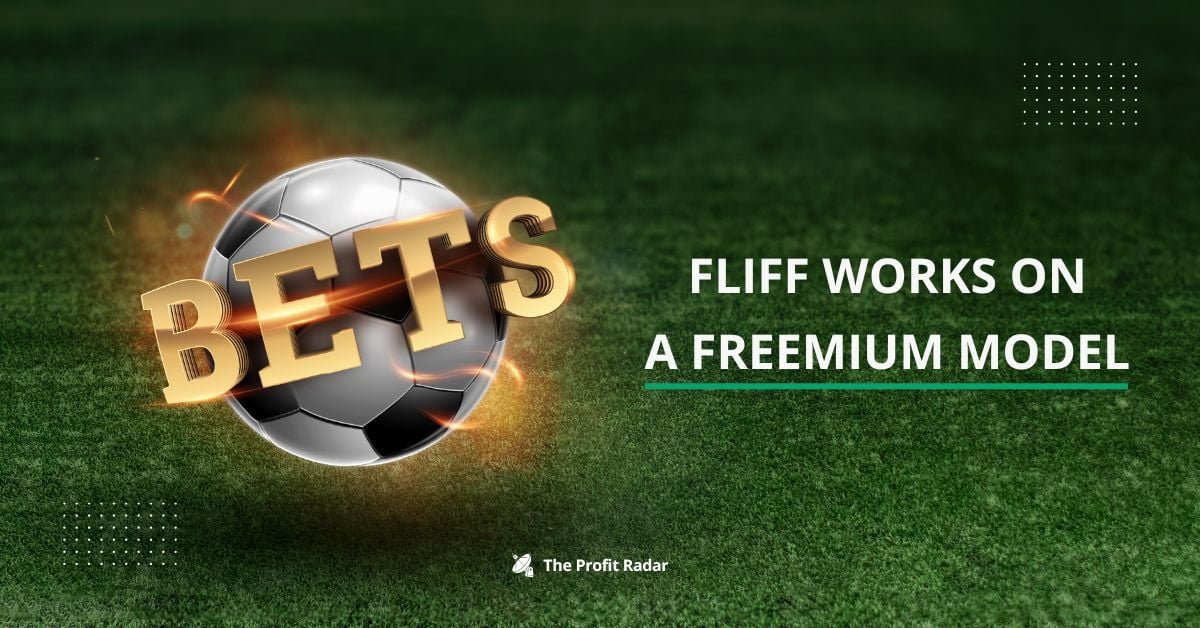How Does Fliff Make Money? Fliff Business Model Explained

Fliff is a free-to-play social sports betting app that offers an entertaining and rewarding betting experience in the United States.
Fliff makes money through microtransactions on virtual currencies, referral programs, and cashback programs. Founded in 2018, Fliff’s annual revenue is estimated to be $3.7M.
But with its free-to-play model and emphasis on sweepstakes, how does this business model actually work?
This blog post will help you understand how Fliff makes money, and what revenue streams keep this unique betting platform running.
Key Takeaways
- Fliff doesn’t operate as a traditional sportsbook. Instead, it works on a sweepstakes model and virtual currencies to create an engaging, free-to-play environment.
- Fliff generates revenue through a combination of microtransactions on virtual currency, referral programs, and cashback partnerships.
- The platform’s focus on user engagement and building a loyal community fuels its growth and monetization strategies.
What Does Fliff Do?

Fliff advertises itself as a “Social Sportsbook” that offers a platform for sports fans to predict the outcomes of games and compete with friends.
Unlike traditional sports betting, Fliff does not require you to wager real money. Rather, users make picks using virtual currencies.
Fliff operates with two primary virtual currencies:
- Fliff Coins: These are used for social predictions against friends. Fliff Coins can be claimed every 2 hours but they don’t actually turn into real-world rewards. They boost your social standing within the platform.
- Fliff Cash: This virtual currency allows participants to participate in sweepstakes for real-money prizes and gift cards. Users can acquire Fliff Cash through free daily rewards, promotional offers, or by purchasing packages with real money.
Now, here’s where it gets interesting…
Fliff Cash cannot be redeemed directly for cash. It just acts as an entry into sweepstakes, where users compete for a chance to win real prizes.
This sweepstakes model allows Fliff to operate legally in most US states where traditional online sports betting is restricted. The reason? Users aren’t risking their own money; they’re using virtual currency to enter prize drawings.
How Does Fliff Work?
Fliff operates on a user-friendly play-for-fun sports picks platform where sports fans can:
Make Picks: Fluff has a wide variety of sports and events available, with users placing predictions on outcomes like winners, scores, and player performances.
Social Interaction: Fluff users can challenge friends, track leaderboards, and engage in discussions about upcoming games which adds a layer of fun and competition.
Virtual Currencies: Fliff Coins are earned through predictions, promotions, or purchased with real money. Fliff Cash can be earned through free daily rewards or by purchasing Fliff Coins.
Sweepstakes Entries: Fliff Cash is used to enter free sweepstakes for a chance to win real-world prizes like cash and gift cards.
Check Out Next: How Does Bilt Make Money: A Complete Analysis
How Does Fliff Make Money?
Fliff’s business model relies on multiple revenue streams that are designed to create a sustainable platform while keeping user engagement high.
Here’s a revenue breakdown of the key components of Fliff’s income streams:
1. Freemium Model with In-App Betting Purchases

Although Fliff offers a baseline free experience with access to most features, users can purchase additional Fliff Coins for wagers or to increase their chances of winning sweepstakes.
This freemium model allows Fliff to tap into a large user base while also generating revenue from dedicated users who want to improve their experience.
2. Referral Programs
Fliff incentivizes existing users to spread the word by offering referral bonuses.
When a user refers a friend who signs up and makes a purchase, they can earn 20 experience points for every $1 their referral spends on purchasing Fliff Coins and 100 experience points for every $5 spent.
This referral program helps Fliff expand its user base and potential for increased in-app purchases at a minimal cost as it acquires new customers through existing, satisfied users.
3. Cashback Partnerships
Fliff has partnered with various online retailers to offer cashback opportunities.
When users make purchases through these partners via the Fliff platform, they earn a percentage of their purchase back in the form of Fliff Cash.
Merchants gain access to a targeted audience of sports fans, potentially driving sales.
This partnership benefits Fliff by driving traffic to its partner merchants and generating revenue through a commission on these purchases.
Check Out Next: Noah Kagan Net Worth 2024: How Does Noah Kagan Make Money
4. Data Monetization (Potential Revenue Source for Fliff)

While Fliff doesn’t explicitly state data monetization as a revenue stream, the potential for it is certainly there.
The platform already has massive user data on sports preferences, spending habits, and engagement patterns.
So, in the future, Fliff could explore anonymized data analysis and insights to offer targeted advertising or partner with sports betting companies in legal markets (with user consent, of course).
3 Lessons We Can Learn from Fliff’s Success
1. Identify a Gap in the Market and Fill It
Fliff’s founders recognized a gap in the sports betting market, as traditional sportsbooks often prioritize high-stakes bettors. They created a social, community-driven platform that caters to casual bettors and focuses on entertainment value. By identifying and filling this gap, Fliff differentiated itself and attracted a loyal user base.
2. Leverage Social Features and Community Building
Fliff’s success can be attributed to its emphasis on social features and community building. The app allows users to create and join groups, share picks, and engage in friendly competitions. By creating a sense of community and social interaction, Fliff created a sticky and engaging user experience that drives retention and acquisition.
3. Prioritize User Experience and Gamification
Fliff’s user-friendly interface and gamification elements, such as leaderboards and rewards, make the app enjoyable and interactive. By prioritizing user experience and gamification, Fliff created a platform that appeals to a broader audience beyond traditional sports bettors, making it more accessible and fun for all users.
Final Thoughts
Fliff’s business model is a prime example of innovation in the online entertainment space.
By creating an engaging social sports betting experience centered around sweepstakes promotions and virtual currencies, Fliff has made a name for itself in the legal online gambling landscape.
With microtransactions, strategic partnerships, and a focus on user engagement, Fliff has built a sustainable revenue model that sustains its growth and rewards its user base.
As Fliff continues to evolve, it will be interesting to see how it refines its existing strategy and potentially introduces new ways to monetize.
Check Out Next: How Does AccuWeather Make Money: AccuWeather’s Business Model Explained
FAQs About Fliff
Is Fliff real money?
Fliff itself doesn’t deal directly with real money for users. It offers two in-app currencies: Fliff Coins (for fun play) and Fliff Cash (for promotional sweepstakes). Fliff Cash can be redeemed for real money prizes, but it’s not directly purchased.
Can you make money from Fliff?
While you can’t directly wager real money on Fliff, you can participate in promotional sweepstakes using Fliff Cash, which has a 1:1 redemption rate with real money prizes.
How does Fliff work?
Fliff allows you to predict sports outcomes and compete with friends or enter contests. You can use Fliff Coins for casual play or Fliff Cash for a chance to win real money prizes (depending on your location).
Can you convert Fliff Coins to cash?
No, Fliff Coins are for fun and social competition and don’t hold any cash value.
What is the minimum withdrawal from Fliff?
There isn’t a minimum withdrawal amount since Fliff Cash isn’t directly deposited. You use Fliff Cash to enter contests with real money prize pools, where the minimum redemption amount is $50. The minimum prize amount will vary depending on the specific contest.






